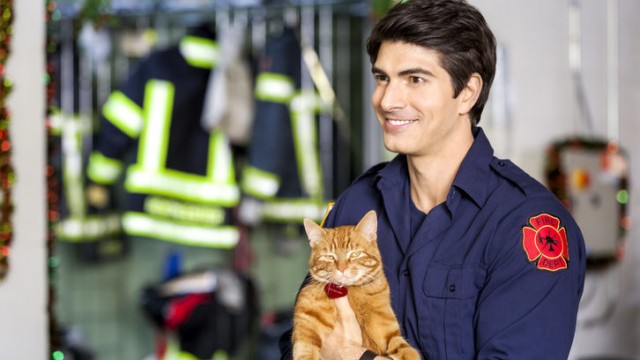Regardless of what we actually believe, the accepted wisdom of popular culture is that Hollywood tends to push liberal ideals through its big screen theatrical releases. Many swathes of America view Hollywood films as having the goals of turning us all into sex addicted godless monsters, destroying all families and eliminating the desire for interpersonal connection. As a result, Hollywood is having a new wave of explicitly Christian films, all receiving a warm welcome from audiences who feel most Hollywood fare to be too much for their families.
In between the two extremes is the Hallmark channel, a channel made up entirely of idealizing a 1950s idea of love, family, community, and personal connection. Throughout the year, the evening is taken up by 2 hours of The Golden Girls followed by 2 hours of Frasier followed by 2 hours of Cheers. This makes the Hallmark movie an ideal medium for the Christmas message of love, family, and friendship. There are some major spoilers in here, mainly because these movies are kind of crazy.
Over the weekend, I took in three of these wholesome ventures, and found myself surrounded by the small-town ideals that seem even more like holdovers from the 1950s than usual. The first, The Nine Lives of Christmas, stars Brandon Routh as a firefighter stud who saw his family disintegrate in front of him, and is now content with casually dating the high-class model daughter of the local animal store. Of course, since the model is high class, she’s snobby, entitled, and, worst of all, she hates cats. When Routh rescues a stray kitty from being threatened by a friendly neighborhood unleashed dog, the cat makes it a point to bond with Superman, and Routh finds true love in the arms of a friendly overworked veterinary student. At every stop, the vet student is told to stop studying so hard and to have a night to herself, drink, and find herself a boyfriend. Because, a trend in these movies, is that women cannot be happy without a mate (and, to be fair, neither are men, but men never have to sacrifice their success for their romantic relationships).
The second I took in was Lacey Chabert’s Twilight Zone-inspired Family For Christmas. Chabert is a successful journalist who covers the important and prescient story of a company bilking their employees out of a Christmas Stocking fund. But, still, Chabert is lonely, regretting the time she got on a plane and rejected her one true love 10 years ago. After baring her soul to a Santa Claus, Chabert wakes up to find herself a housemother married to that ex-boyfriend with children. Her children are horrific demanding brats, who force her to pick fruit bits out of their cereal every morning. Her husband guilts her into being the perfect mom. And, because she stumbles the first day in the new life, her children give her the silent treatment, climatically screaming “You know nothing about nothing important.” Later, when a candy cane falls on a news reporter, instead of helping the woman, Chabert takes the mic and finishes the report herself, relaunching her career to the chagrin of both her husband and her kids. If this were a Lifetime movie, Chabert would have a free license to kill her whole family, and no jury would convict. But, instead, she rejects her career and embraces her family…to wake up in her old life. Suddenly, she gives up her job so she can go on a date with the still unmarried ex-boyfriend and they walk off into their future, jobless and soon-to-be homeless. A woman can’t have a job and a family, ever.
Just In Time For Christmas presents the inverse of Family For Christmas, where a Washington State barista is dating the cafe owner. The same day she receives an opportunity for being published and becoming a full professor at Yale, her boyfriend proposes. After speaking with William Shatner, she is fast forwarded to a future where she accepted the position and rejected the boyfriend. She discovers that he opened up a third coffee shop, her mother had a heart attack and moved on (…after a commercial break…to Sweden with her doctor), and her book is a best selling novel earning her $2 million in royalties. But, in the grand tradition of Mahogany, if she can’t have her boyfriend, nothing else matters. So, after turning into a home wrecker, she gets rewound back to the night of the decision, and…TWIST ENDING, she tells her boyfriend that her success is important to her, but that she wants to be with him. For the first time in three movies, it’s the guy who must sacrifice his successful coffee shop to start another one in Cambridge.
What can we learn? Love is about sacrifice? Women can’t manage careers and love? Family, friends and community trumps money and success? Love is more important than the corrupt behavior of company owners? That white people form the ideals of the community (seriously, I think there were like 3 speaking minority characters over three movies)? These movies are cheap, fast, and on the fly, and weird as hell (Christmas seems to be beside the point in every case).
If you want to hear how these movies generally get made, The B-Movies Podcast interviewed Jim Fall, director of Holiday Engagement and Hollie’s Holiday as well as 1999’s gay rom-com Trick and The Lizzie McGuire Movie. He spills a bit of tea about the various complications of these, including working with Shelley Long.
What are your Hallmark movie favorites of the season?
(side note: Mariah Carey’s directorial debut, A Christmas Melody, premieres at 8:00 EST this Saturday)

